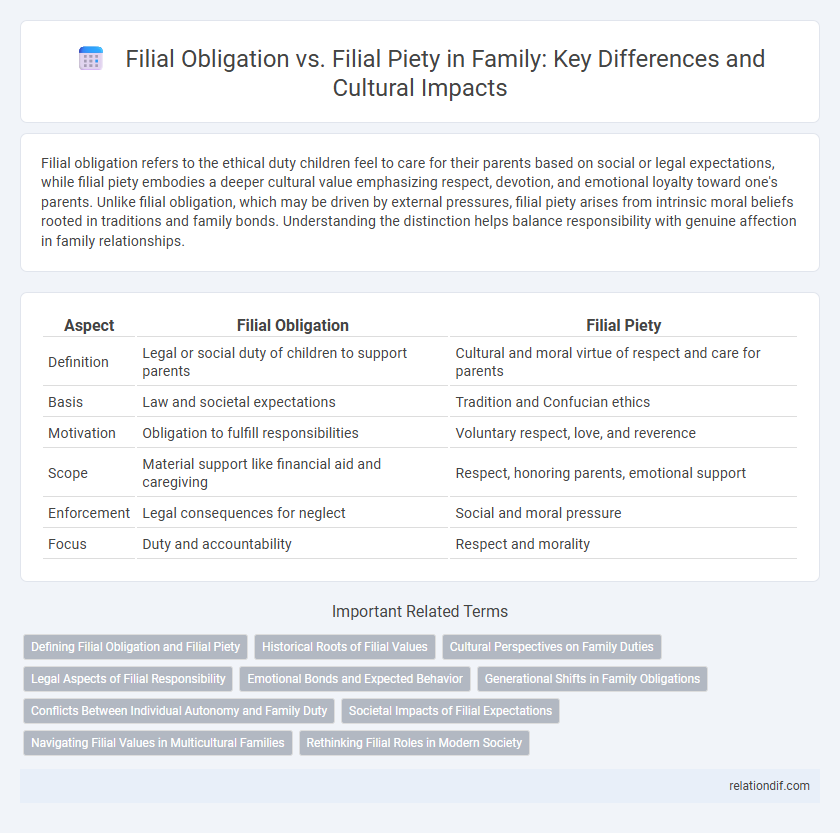Filial obligation refers to the ethical duty children feel to care for their parents based on social or legal expectations, while filial piety embodies a deeper cultural value emphasizing respect, devotion, and emotional loyalty toward one's parents. Unlike filial obligation, which may be driven by external pressures, filial piety arises from intrinsic moral beliefs rooted in traditions and family bonds. Understanding the distinction helps balance responsibility with genuine affection in family relationships.
Table of Comparison
| Aspect | Filial Obligation | Filial Piety |
|---|---|---|
| Definition | Legal or social duty of children to support parents | Cultural and moral virtue of respect and care for parents |
| Basis | Law and societal expectations | Tradition and Confucian ethics |
| Motivation | Obligation to fulfill responsibilities | Voluntary respect, love, and reverence |
| Scope | Material support like financial aid and caregiving | Respect, honoring parents, emotional support |
| Enforcement | Legal consequences for neglect | Social and moral pressure |
| Focus | Duty and accountability | Respect and morality |
Defining Filial Obligation and Filial Piety
Filial obligation refers to the moral and legal duties children owe to their parents, often emphasizing support and care as a social expectation. Filial piety, rooted in Confucian philosophy, embodies a deeper cultural and ethical reverence, highlighting respect, loyalty, and devotion toward one's parents. Understanding the distinction helps clarify how familial responsibilities are interpreted across different societies and legal frameworks.
Historical Roots of Filial Values
Filial obligation and filial piety both originate from deep-rooted cultural and historical traditions that emphasize respect and duty toward one's parents and ancestors. In Confucianism, filial piety (xiao) is a central virtue, embodying reverence and unwavering loyalty, shaping family dynamics in East Asian societies for centuries. Western concepts of filial obligation, often linked to legal and ethical responsibilities, also reflect historical shifts in family structure and societal expectations throughout European history.
Cultural Perspectives on Family Duties
Filial obligation and filial piety reflect cultural perspectives on family duties, where filial obligation emphasizes legal and social responsibilities, often seen in Western contexts, while filial piety, rooted in Confucian traditions, highlights deep respect, loyalty, and emotional devotion toward parents in East Asian cultures. These contrasting approaches shape caregiving practices, inheritance norms, and intergenerational relationships, influencing policies and family dynamics globally. Understanding these cultural distinctions is crucial for addressing elder care and family support systems in multicultural societies.
Legal Aspects of Filial Responsibility
Filial obligation refers to the legal duty imposed on adult children to support their elderly parents, often codified in family law statutes across various jurisdictions. Filial piety, primarily a cultural and ethical concept rooted in Confucian values, emphasizes respect and care without explicit legal enforcement. Understanding the distinction highlights that while filial obligation can result in court-mandated support or penalties, filial piety relies on societal norms and moral expectations rather than legal mandates.
Emotional Bonds and Expected Behavior
Filial obligation emphasizes duties rooted in social expectations and responsibilities to care for aging parents, often guided by cultural norms and legal frameworks. Filial piety extends beyond obligation, encompassing deep emotional bonds characterized by respect, love, and gratitude towards parents, reinforcing family unity and harmony. These emotional connections motivate voluntary caregiving behaviors, creating a reciprocal relationship that strengthens intergenerational support within families.
Generational Shifts in Family Obligations
Generational shifts in family obligations reveal a nuanced divergence between filial obligation and filial piety, where younger generations emphasize emotional support and mutual respect over rigid adherence to traditional duties. Filial piety, rooted in Confucian values, stresses unquestioning devotion and care for elderly parents, while filial obligation reflects a contemporary, reciprocal approach balancing autonomy and care. Demographic changes, urbanization, and increased individualism influence evolving expectations, reshaping intergenerational relationships within modern families.
Conflicts Between Individual Autonomy and Family Duty
Filial obligation often emphasizes legal and social responsibilities to care for aging parents, while filial piety deeply roots in Confucian values prioritizing respect and devotion to elders. Conflicts arise when individual autonomy clashes with these expectations, creating tension between personal freedom and cultural duties. Balancing modern individualism with traditional family loyalty challenges the dynamics of caregiving and decision-making within many East Asian families.
Societal Impacts of Filial Expectations
Filial obligation and filial piety shape societal dynamics by reinforcing intergenerational support systems, which enhance social stability and cohesion. Expectations for adult children to care for aging parents reduce reliance on state welfare, fostering community-based caregiving. These cultural norms can also create pressures that affect family relationships, mental health, and socioeconomic outcomes.
Navigating Filial Values in Multicultural Families
Navigating filial obligation and filial piety within multicultural families requires understanding diverse cultural expectations regarding respect, care, and responsibility towards elders. Filial obligation often emphasizes legally or socially mandated duties, while filial piety reflects deep-rooted moral and emotional reverence found in Confucian traditions. Balancing these values fosters harmonious family dynamics by recognizing both universal caregiving principles and culturally specific expressions of elder respect.
Rethinking Filial Roles in Modern Society
Filial obligation, rooted in legal and social expectations, emphasizes duty and responsibility toward aging parents, while filial piety, deeply embedded in Confucian ethics, stresses respect, loyalty, and emotional reverence. Modern society witnesses a redefinition of these roles due to increased geographic mobility, diverse family structures, and evolving cultural values that challenge traditional norms. Balancing practical care with emotional support requires integrating contemporary understandings of autonomy and interdependence within family dynamics.
filial obligation vs filial piety Infographic

 relationdif.com
relationdif.com